Junior Maria Drake is spending the semester working with Dr. Pablo Delis, professor of biology, to continue a long-running study at North Mountain in Franklin County.
“We’re doing research on amphibian communities. What we’ve done is set recorders in the field, and what they’re doing is collecting frog calls in two areas. One is a wetland at the bottom of the mountain, and the other is a vernal pool at the top of the mountain. We’re looking at effects in climate change that might affect when the frogs call. We’re also looking at how they moved into the newly-restored wetland, finding the density and what species are there,” explained Drake.
The study, spanning over 17 years, gives Drake an opportunity to get out into the field, even in a time of distance. She says she’s lucky to be doing this now, as many universities are forgoing having in-person labs and research.
A self-described “outdoorsy” person, Drake enjoys continuing to have hands-on work, something that’ll deem crucial in the long-run.
“It’s one of the reasons why I chose Ship. I was excited that I didn’t have to wait to do my research. I actually would’ve been starting sooner if it weren’t for the pandemic,” Drake said. “To be able to get outside and not only do research, but also have labs outside, it makes it a more normal experience.”
Drake credits faculty for providing an abundance of research and hands-on learning opportunities, that is further enhanced but their willingness to share their professional experiences.
“I feel like I’ve had a personal connection with every professor I’ve had. Not only do I have a connection with them but they have connections to other universities and professors. That’s going to come in handy in the future.”

